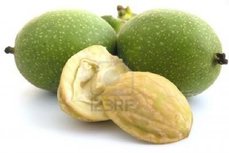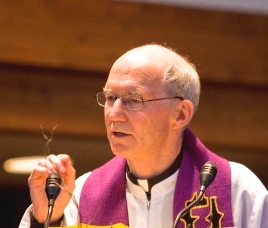
First comes the "literal" sense, what the words actual mean. That is our starting point, but as the Holy Father points out, the literal sense "conceals depths that are not immediately apparent." Beneath the literal sense is a "moral" sense - what we must do in living the Word. Finally, we come to "spiritual" sense - "the unity of Scripture which throughout its development speaks of Christ."
Pope Benedict then explains how Origen compares the three senses of Scripture to fresh walnuts. Outside is like the green husk - bitter because the literal meaning is often difficult to grasp, living as we do so far removed from the original authors and their times.
If we penetrate the literal sense (and it may requires a a lot of effort) we come to the moral sense. It is like the hard shell of a walnut. It protects the nourishing, tasty meat inside. What's inside of course has most value. We want the full, spiritual sense of God's Word. That's the meat, the heart of the matter.
This comparison of the fresh walnut can also apply to our relationship with Christ - as we see in today's readings. We hear about three men who had to face the bitterness of their sinful condition. When Isaiah saw the vision of the Holy One, he cried out, "Woe is me, I am doomed! For I am a man of unclean lips, living among people of unclean lips." Similar to Isaiah, Peter fell at the knees of Jesus and said, "Depart from me, Lord, for I am a sinful man." And St. Paul says, "I am the least of the apostles, not fit to be called an apostle."
Isaiah, Peter and Paul tasted the bitter reality of their unworthiness. Fortunately, it did not lead them to despair - to throw everything away. Rather, it lead them to a profound moral renewal. St. Paul said that he "toiled harder than all of them." But he quickly added, "not I, however, but the grace God that is with me." Isaiah experience moral renewal by a burning coal being placed to his lips. Peter, being Peter, took a little longer for his full conversion.
These three - Isaiah, Paul and Peter - provide great models for us as we enter the season of Lent. Fasting, prayer and almsgiving do not immediately attract us. They are like that green husk. We have to go through those disciplines to reach the substance. And that hard shell - the moral life - it protects the life inside. I picked up a walnut without noticing that the shell had been slightly broken. What was inside had become spoiled and worm-eaten.
That's why the first words we will hear this Wednesday are, "return to me." The Lord can renew us no matter what the state of our souls. But we have to return to him. To repent. To return to the moral life.
The moral life, of course, is not an end in itself. It protects us from devil destroying our relation to God. But it is that relationship that nourish and gives savor to our lives. As the Psalm says, "The Lord will complete what he has done for me; your kindness, O Lord, endures forever."
So, as Scripture has three senses, so our relation to God has three stages: the awareness of unworthiness, the return the moral life and savoring the mystery of God - his love endures forever. Amen

 RSS Feed
RSS Feed
